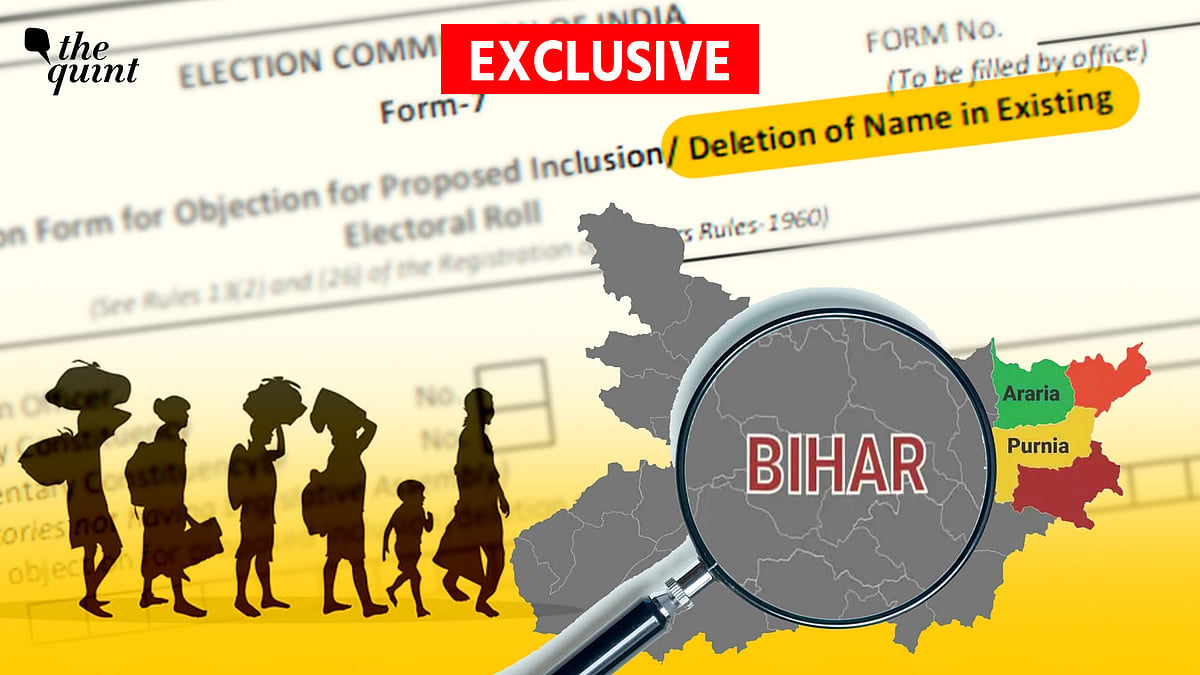
Bihar SIR: 40 Removed Due to 'Citizenship' in Seemanchal, Majority Hindus
Only 106 objections related to citizenship were filed across four districts of Seemanchal.

advertisement
“We will pick out and drive away the infiltrators”
“This election is about driving infiltrators out of Bihar.”
Union Home Minister Amit Shah made this statement in Araria — one of the four districts in Bihar’s Seemanchal region, which has a sizable concentration of Muslims. Now, after the completion of the Special Intensive Revision (SIR) process across Bihar, including Seemanchal, the picture regarding “infiltrators” has become clear.
Across the four Seemanchal districts — Araria, Katihar, Kishanganj, and Purnia — only 106 objections related to citizenship were filed. These objections were submitted through Form 7 of the Election Commission, which is used to request the removal of someone’s name from the voter list.
After examining these 106 objections, the Election Commission deleted 40 names from the voter list. What happened to the remaining objections? And what is the truth behind the claims made during Bihar’s SIR regarding “infiltrators” in Seemanchal? How many of these were Hindus and how many were Muslims? Let’s examine all of it, one by one.
“Not Indian Citizen” — 84 objections in Araria district
Seemanchal has the highest concentration of Muslims in Bihar. The Muslim population is 68% in Kishanganj, 44% in Katihar, 43% in Araria, and 38% in Purnia. Together, these four districts account for 24 Assembly constituencies.
During the Special Intensive Revision, objections were filed to delete names from the voter list citing the reason “Not Indian Citizen.” Only 2 such objections were filed in Kishanganj, while 84 in Araria, 12 in Purnia, and 8 in Katihar were related to citizenship.
Out of 106 objections, 59 people proved Indian citizenship
According to the Election Commission, out of the 106 total citizenship-related objections filed in the four districts of Seemanchal, 59 individuals successfully proved their Indian citizenship and retained their names in the final voter list by submitting documents.
However, when checked on the Election Commission’s website using their EPIC numbers, only 35 of these 59 names appear in the database. The remaining 24 names are not visible on the site but are present in the voter list — both with the same EPIC numbers. (For example, in the screenshot below, the objection list and the voter list show the same person, Manish Bodhra, but when searched by EPIC number, the website shows “No Record Found.”
25 Hindus and 15 Muslims deleted for “non-citizenship”
Out of the 106 objections:
59 people proved citizenship and remained in the final voter list.
47 names were deleted for not being able to prove citizenship.
Among these 47:
28 were Hindus
19 were Muslims
Of the 47 deleted names, 7 individuals were found deceased (3 Hindus and 4 Muslims).
Thus, if we consider only living individuals who were voters but were excluded from the final list during the SIR for not proving citizenship, the total number is 40, including 25 Hindus and 15 Muslims.
More objections around migration than citizenship
During the Special Intensive Revision in Seemanchal, a total of 64,050 objections were filed for deleting names from the voter list.
26,993 objections (42%) were due to migration (permanent relocation).
Only 0.17% objections were related to “Not an Indian citizen.”
About 20% objections were due to death.
Why were 14% of objections missing reasons for name deletion?
All the objections mentioned above were filed using Form-7, which requires specifying a reason for requesting the deletion of a name from the voter list.
However, in Seemanchal, 9,567 objections (14%) did not mention any reason at all. In some cases, even the name of the person filing the objection or the person whose name was to be deleted was not specified — the reason field simply said “undefined (Other).”
In Araria, 6,692 such reasonless objections were filed. Some similar cases were also found in Purnia and Katihar.
This raises the question: if other objections mentioned reasons, why were these 14% objections left blank?
- Access to all paywalled content on site
- Ad-free experience across The Quint
- Early previews of our Special Projects
Published: undefined